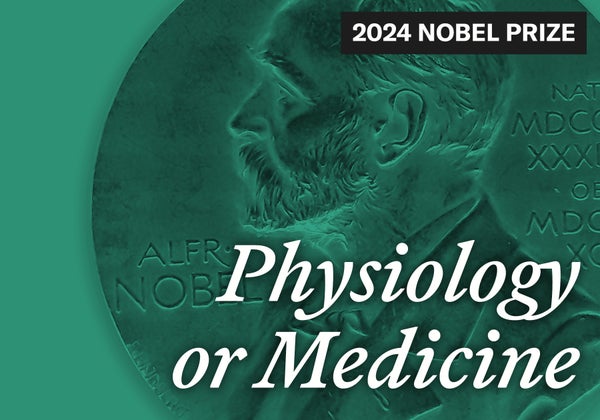October 7, 2024
3 min read
Nobel Prize in Physiology or Medicine Awarded for Discovery of MicroRNA Gene Regulation
The 2024 Nobel Prize in Physiology or Medicine was given to Victor Ambros and Gary Ruvkun for the discovery of an important gene-manipulating mechanism in cells
vanbeets/Getty Images (medal)
Every cell in our body contains the same set of genetic instructions, or DNA. Yet only some of these genes are expressed in each cell, leading to the production of proteins that perform the cell’s unique functions. The 2024 Nobel Prize in Physiology or Medicine was awarded on Monday to U.S. scientists Victor Ambros and Gary Ruvkun for the discovery of microRNA, a molecule that performs this important regulatory process.
The discovery opened up a new field in gene regulation, explaining how only some of the many genetic instructions in DNA result in functional proteins in different cells. The research was initially conducted in the tiny roundworm Caenorhabditis elegans, but the mechanism has since been found in the genes of humans and most other animals.
Ambros performed his part of the work at Harvard University, and he is currently a professor of natural sciences at the University of Massachusetts Chan Medical School. Ruvkun carried out his research concurrently at Massachusetts General Hospital and Harvard Medical School, where he is now a professor of genetics.
On supporting science journalism
If you’re enjoying this article, consider supporting our award-winning journalism by subscribing. By purchasing a subscription you are helping to ensure the future of impactful stories about the discoveries and ideas shaping our world today.
“The seminal discovery of microRNA has introduced a new and unexpected mechanism of gene regulation,” said Olle Kämpe, vice chair of the Nobel Committee for Physiology or Medicine 2024, while describing the research during a press conference in Stockholm on Monday.
In cells, genes are transcribed into messenger RNAs (mRNAs), which are then translated into proteins. Proteins perform the many vital functions within any cell, whether that cell is in nerve tissue, muscle or the immune system—or anywhere else. Problems with gene function can lead to conditions such as cancer, diabetes and autoimmune disease.
As early as the 1960s scientists had discovered that proteins called transcription factors could bind to genes and control what parts of those genes got transcribed into mRNA. This mechanism was thought to be…
Click Here to Read the Full Original Article at Scientific American Content: Global…

